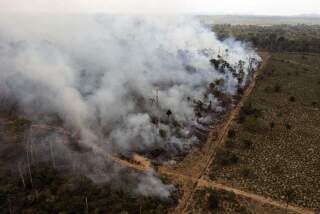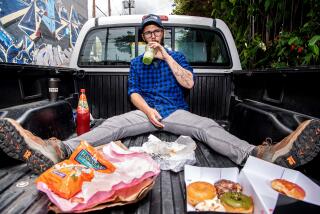The Cutting Edge: Computing / Technology / Innovation : Road Trip Will Run on Lard, Not Diesel Fuel
- Share via
SAN FRANCISCO — Five Bay Area women will embark next week on an ordinary summer journey in an extraordinary fashion: They’ll be driving a 1984 Chevy diesel van across the country, but instead of diesel fuel, they’ll be filling their tank with used french fry oil from fast-food joints.
If they succeed, Nicole Cousino, Sarah Lewison, Florence Dore, Julie Konop and Gina Todus--who will make a documentary film of the trip--will be the first to complete a lard-powered cross-country voyage.
The technology involved has been around in part since the late 1800s, when Rudolph Diesel invented the diesel engine. Even then, his engine could run on vegetable oil, but it was hard to burn and tended to clog fuel lines. These problems have been solved by a process called transesterification.
To chemists, esterifying plant oils is fairly simple: Mix in the right amount of alcohol along with a catalyst, and the basic molecules of the oil--known as triglycerides--are turned into hydrocarbons that resemble normal diesel.
The touring filmmakers will carry out their experiment with the help of donations from environmental advocate Greenpeace and a Burger King franchisee. Though they don’t have advanced chemistry degrees, they do have a reliable recipe for whipping up biodiesel on the road: 80 parts french fry oil (which must be poured through a filter to remove the bits of fries), 19 parts methanol (wood alcohol) and one part Drano (sodium hydroxide, the catalyst).
The ingredients are mixed together, impurities at the top are skimmed off, and the whole batch is washed with water. The resulting light-yellow esters are supposed to run a diesel engine as well as any fuel you buy at the pump. And with the oil free, it’s cost-competitive.
Biodiesel pleases both Midwestern grain farmers and environmentalists. It produces no sulfur dioxide--which causes acid rain--and releases no more carbon dioxide than its source crops consume, so there’s no net addition of greenhouse gases to the atmosphere.
Yes, the van’s exhaust will smell like doughnuts. But it won’t have a black exhaust plume like vehicles running on conventional diesel. And it will help burn up the grease Americans discard yearly: some 2.4 billion pounds, according to Render, a trade magazine.
The women leave New York on Tuesday and plan to arrive in San Francisco Aug. 26. Along the way, dressed in orange neon waitress outfits, they’ll videotape demonstrations of the technology as well as interviews about sustainable energy and alternative fuels.
More to Read
Inside the business of entertainment
The Wide Shot brings you news, analysis and insights on everything from streaming wars to production — and what it all means for the future.
You may occasionally receive promotional content from the Los Angeles Times.










